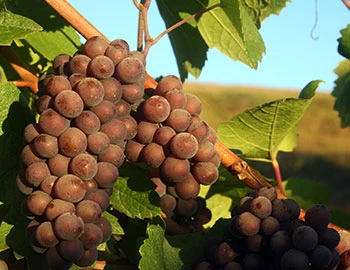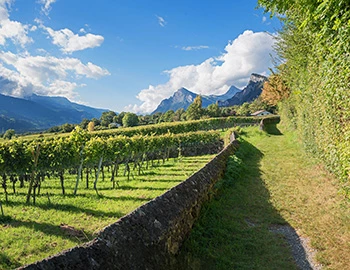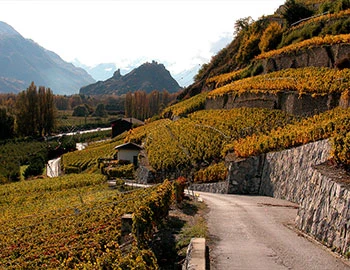Pinot Gris 2022
AOC Uetikon, Erich Meier, 750 ml

| Grape variety: | Pinot gris |
| Producer: | Erich Meier |
| Origin: | Switzerland / Ostschweiz / Zürich |
| Other vintages: |
Description
Multi-layered wine with subtle minerality, powerful bouquet of pears, tangerines and slate, floral components. Dense, full, fresh palate with fine, fragrant fruit, well-integrated, fine acidity, velvety structure, long, fine tart finish.
Attributes
| Origin: | Switzerland / Ostschweiz / Zürich |
| Grape variety: | Pinot gris |
| Label: | Vegan |
| Ripening potential: | 1 to 3 years after harvest |
| Drinking temperature: | 10 to 12 °C |
| Food Pairing: | Smoked fish, Fish terrine |
| Vinification: | short must fermentation, soft pressing |
| Harvest: | hand-picking |
| Maturation: | in used barriques, bâtonnage, short cultivation |
| Bottling: | filtration |
| Maturation duration: | 4 months |
| Volume: | 13.0 % |
| Note: | Contains sulphites |
Pinot gris
The aromas of the forest
Pinot gris is, like the Pinot blanc, a colour mutation of Pinot noir. All three have the same genetic profile. On occasion, red, grey, pink and white, berries can be observed on the same vine stock. Some are even striped! The best Pinot grises introduce themselves opulently with ripe peach and apricot aromas, slightly woody notes and a bit of smoke. These characteristics are presented, for example, in examples from Alsace, Grauburgunders from Germany, or the representatives from Valais, where the grapes are erroneously referred to as Malvoisie. In Italy, Pinot grigio from South Tyrol and Friuli win out. Wines from this variety are great culinary companions. They get along superbly with autumnal dishes such as risotto with mushrooms or chestnuts.

Zürich
Zurich: On the way to the top
With a cultivated area of 620 hectares, Zurich is the largest wine-producing canton in German-speaking Switzerland. The potential is great at prime locations on Lake Zurich and in the various river valleys. It is no surprise that a steadily increasing number of top wines are vinified here. The major variety is Pinot Noir. But white varieties also exceed exquisitely, such as Müller-Thurgau and the long-established Räuschling, as well as international varieties like Chardonnay and Sauvignon Blanc. The wine-producing canton of Zurich is currently experiencing the most sustained upswing in quality in its history.

Ostschweiz
Eastern Switzerland: an intriguing puzzle
Eastern Switzerland has long been positioned on the northern rim of the climate zone where the cultivation of popular Swiss varieties is possible. Due to a warming climate, the vineyards of Aargau, Zurich, Schaffhausen, Thurgau and Graubünden are now in the zone where varieties such as Müller-Thurgau or Pinot Noir succeed excellently. But even long-established, almost-forgotten varieties such as Elbling, Räuschling and Completer are experiencing a renaissance.

Switzerland
Switzerland – A small country with enormous diversity
Switzerland is famous for its banks, watches, and cheese, but not necessarily for its wine. The Swiss didn't invent wine, but they have been extremely open and curious to it. Wine culture arrived in what is now modern Switzerland via several routes: from Marseilles to Lake Geneva and the Lower Valais region; from the Aosta Valley through the Great St. Bernard Pass to the rest of Valais; from the Rhone through Burgundy, across the Jura Mountains to Lake Constance; and from Lombardy to Ticino, and then on to Grisons.



